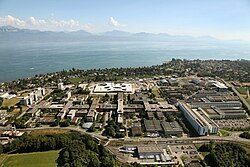
Switzerland Innovation (German: Schweizerischer Innovationspark, French: Parc suisse d'innovation), organised through the Switzerland Innovation Foundation is the Swiss national network of science parks. [1]
Contents
- Company involvement
- Switzerland Innovation Park Network West EPFL
- Swiss Innovation Park Zürich[3]
- See also
- References
- External links
It was inaugurated by Johann Schneider-Ammann on 18 January 2016 and will be organised around five locations: [1]
- Swiss Innovation Park Basel Area (in Allschwil);
- Swiss Innovation Park innovaare (near the Paul Scherrer Institute in Villigen);
- Swiss Innovation Park Zurich (on areas of the Dübendorf Air Base);
- Swiss Innovation Park Biel/Bienne;
- Switzerland Innovation Park Network West EPFL ("Romandy hub"):
